-
 Bitcoin
Bitcoin $119700
0.53% -
 Ethereum
Ethereum $4508
5.39% -
 XRP
XRP $3.270
2.86% -
 Tether USDt
Tether USDt $1.000
0.00% -
 BNB
BNB $831.0
2.92% -
 Solana
Solana $189.6
6.89% -
 USDC
USDC $0.9999
-0.01% -
 Dogecoin
Dogecoin $0.2350
2.92% -
 TRON
TRON $0.3500
1.34% -
 Cardano
Cardano $0.8420
6.73% -
 Chainlink
Chainlink $23.26
8.42% -
 Hyperliquid
Hyperliquid $44.42
1.44% -
 Stellar
Stellar $0.4512
3.16% -
 Sui
Sui $3.895
5.15% -
 Bitcoin Cash
Bitcoin Cash $618.7
5.88% -
 Hedera
Hedera $0.2601
4.43% -
 Ethena USDe
Ethena USDe $1.001
0.01% -
 Avalanche
Avalanche $24.45
4.90% -
 Litecoin
Litecoin $128.1
5.41% -
 Toncoin
Toncoin $3.454
1.64% -
 UNUS SED LEO
UNUS SED LEO $9.065
0.44% -
 Shiba Inu
Shiba Inu $0.00001359
3.41% -
 Uniswap
Uniswap $11.42
1.78% -
 Polkadot
Polkadot $4.165
6.36% -
 Cronos
Cronos $0.1664
-0.50% -
 Ethena
Ethena $0.8108
1.79% -
 Dai
Dai $1.000
0.00% -
 Pepe
Pepe $0.00001213
5.22% -
 Bitget Token
Bitget Token $4.438
0.25% -
 Aave
Aave $313.3
5.02%
What are the smart contract functions of BNB?
BNB's functionality stems from its integration with Binance Smart Chain (BSC), enabling smart contracts for dApps, DEXs, and token creation. However, users must consider security and gas fees, understanding inherent risks and limitations of BSC.
Mar 07, 2025 at 12:46 pm

Key Points:
- BNB's smart contract functionality is primarily enabled through its integration with the Binance Smart Chain (BSC).
- These smart contracts facilitate decentralized applications (dApps), enabling functionalities like token creation, decentralized exchanges (DEXs), and more.
- BNB itself plays a crucial role in BSC's ecosystem, serving as the native token for transaction fees and network interaction.
- Security and gas fees are important considerations when using BNB smart contracts.
- Understanding the limitations and potential risks associated with smart contracts on BSC is crucial for safe usage.
What are the smart contract functions of BNB?
BNB, the native token of the Binance ecosystem, doesn't possess inherent smart contract functionality in itself. Instead, its power lies in its integration with the Binance Smart Chain (BSC). BSC is a blockchain designed to support smart contracts, enabling the creation and deployment of decentralized applications (dApps). BNB acts as the fuel for these dApps, facilitating transactions and powering the entire BSC ecosystem.
How do BNB smart contracts work within the BSC ecosystem?
BNB smart contracts operate on the BSC using the Solidity programming language, similar to Ethereum. Developers write code that defines the rules and logic of a specific contract. This code is then compiled and deployed onto the BSC network. Once deployed, the contract's functions can be interacted with by users and other contracts. This interaction happens through transactions that require BNB as gas fees.
What types of dApps can be built using BNB smart contracts?
The possibilities are vast. Developers leverage BNB smart contracts to create a wide range of dApps, including:
- Decentralized Exchanges (DEXs): These allow users to trade cryptocurrencies directly without intermediaries. PancakeSwap is a prime example of a DEX built on BSC using BNB.
- Decentralized Finance (DeFi) applications: These include lending and borrowing platforms, yield farming opportunities, and other financial services built on the blockchain. Many DeFi protocols rely on BNB for transactions.
- Non-Fungible Token (NFT) marketplaces: These platforms facilitate the buying, selling, and trading of unique digital assets. Several NFT marketplaces operate on BSC, using BNB for transactions.
- Gaming applications: Play-to-earn games and other interactive experiences are increasingly built on BSC, using BNB for in-game transactions and rewards.
- Token creation and management: Developers can easily create and manage their own tokens on BSC, leveraging the efficiency and low cost of the network.
What are the security considerations for BNB smart contracts?
Security is paramount. Smart contracts, while powerful, are vulnerable to bugs and exploits if not carefully audited and developed. Developers must rigorously test their contracts before deployment to prevent vulnerabilities that could lead to loss of funds. Users should also exercise caution when interacting with unfamiliar contracts, carefully researching their reputation and security audits.
What are the gas fees associated with BNB smart contracts?
Gas fees represent the computational cost of executing transactions on the BSC network. These fees are paid in BNB. The cost varies depending on the complexity of the smart contract interaction. Higher gas fees typically indicate more computationally intensive operations. Network congestion can also impact gas fees, leading to potentially higher costs during periods of high activity.
How do I interact with BNB smart contracts?
You'll need a compatible cryptocurrency wallet that supports BSC, such as MetaMask or Trust Wallet. Once you have a wallet connected to BSC and some BNB, you can interact with smart contracts through various interfaces. Many dApps provide user-friendly interfaces for interacting with their contracts. You can also use tools like web3.js libraries for more advanced interactions.
What are the limitations of using BNB smart contracts?
While BSC offers several advantages, including speed and low transaction costs, it's essential to be aware of limitations:
- Scalability: While BSC has improved its scalability, it can still experience congestion during peak times, leading to higher gas fees and slower transaction speeds.
- Centralization concerns: Binance, as the entity behind BSC, has some level of control over the network, which raises concerns about decentralization for some users.
- Security risks: As mentioned earlier, smart contracts are vulnerable to exploits if not properly developed and audited.
Common Questions and Answers:
Q: Is it risky to use BNB smart contracts?
A: There's inherent risk in using any smart contract, regardless of the blockchain. Thorough research, auditing of the contract, and using reputable platforms can help mitigate these risks.
Q: How much BNB do I need to interact with smart contracts?
A: The amount of BNB required depends on the specific smart contract interaction and current gas fees. It's crucial to have sufficient BNB to cover transaction costs.
Q: Can I create my own BNB smart contract?
A: Yes, with sufficient programming knowledge in Solidity and understanding of blockchain development. However, this requires expertise and careful consideration of security best practices.
Q: What are the advantages of using BNB smart contracts compared to Ethereum smart contracts?
A: BSC often offers lower transaction fees and faster transaction speeds compared to Ethereum. However, Ethereum boasts a more established and mature ecosystem.
Q: Are there any tutorials or resources available to learn more about BNB smart contracts?
A: Yes, numerous online resources, including Binance Academy and various developer communities, offer tutorials and documentation on BSC smart contract development.
Disclaimer:info@kdj.com
The information provided is not trading advice. kdj.com does not assume any responsibility for any investments made based on the information provided in this article. Cryptocurrencies are highly volatile and it is highly recommended that you invest with caution after thorough research!
If you believe that the content used on this website infringes your copyright, please contact us immediately (info@kdj.com) and we will delete it promptly.
- Unich's OTC Exchange: Surging with $1.2B Volume – What's the Hype?
- 2025-08-13 02:50:11
- MoonBull's Explosive Moves: Your Crypto Whitelist Ticket to Ride!
- 2025-08-13 02:30:11
- MAGACOIN Finance: Don't Miss the Presale Bonus!
- 2025-08-13 02:30:11
- Trump's Crypto Kingdom: $2.4 Billion and Counting
- 2025-08-13 02:50:11
- Solana, LSTs, and SEC Approval: A New Dawn for Crypto?
- 2025-08-13 02:55:12
- Bitcoin's Profit Surge: Unpacking the BTC Value Boom
- 2025-08-13 02:55:12
Related knowledge

How to purchase Aragon (ANT)?
Aug 09,2025 at 11:56pm
Understanding Aragon (ANT) and Its PurposeAragon (ANT) is a decentralized governance token that powers the Aragon Network, a platform built on the Eth...

Where to trade Band Protocol (BAND)?
Aug 10,2025 at 11:36pm
Understanding the Role of Private Keys in Cryptocurrency WalletsIn the world of cryptocurrency, a private key is one of the most critical components o...

What is the most secure way to buy Ocean Protocol (OCEAN)?
Aug 10,2025 at 01:01pm
Understanding Ocean Protocol (OCEAN) and Its EcosystemOcean Protocol (OCEAN) is a decentralized data exchange platform built on blockchain technology,...

How to invest in Kyber Network Crystal v2 (KNC)?
Aug 12,2025 at 05:21pm
Understanding Kyber Network Crystal v2 (KNC)Kyber Network is a decentralized liquidity hub built on the Ethereum blockchain that enables instant token...

Where can I buy UMA (UMA)?
Aug 07,2025 at 06:42pm
Understanding UMA and Its Role in Decentralized FinanceUMA (Universal Market Access) is an Ethereum-based decentralized finance (DeFi) protocol design...

What exchanges offer Gnosis (GNO)?
Aug 12,2025 at 12:42pm
Overview of Gnosis (GNO) and Its Role in the Crypto EcosystemGnosis (GNO) is a decentralized prediction market platform built on the Ethereum blockcha...

How to purchase Aragon (ANT)?
Aug 09,2025 at 11:56pm
Understanding Aragon (ANT) and Its PurposeAragon (ANT) is a decentralized governance token that powers the Aragon Network, a platform built on the Eth...

Where to trade Band Protocol (BAND)?
Aug 10,2025 at 11:36pm
Understanding the Role of Private Keys in Cryptocurrency WalletsIn the world of cryptocurrency, a private key is one of the most critical components o...

What is the most secure way to buy Ocean Protocol (OCEAN)?
Aug 10,2025 at 01:01pm
Understanding Ocean Protocol (OCEAN) and Its EcosystemOcean Protocol (OCEAN) is a decentralized data exchange platform built on blockchain technology,...

How to invest in Kyber Network Crystal v2 (KNC)?
Aug 12,2025 at 05:21pm
Understanding Kyber Network Crystal v2 (KNC)Kyber Network is a decentralized liquidity hub built on the Ethereum blockchain that enables instant token...

Where can I buy UMA (UMA)?
Aug 07,2025 at 06:42pm
Understanding UMA and Its Role in Decentralized FinanceUMA (Universal Market Access) is an Ethereum-based decentralized finance (DeFi) protocol design...

What exchanges offer Gnosis (GNO)?
Aug 12,2025 at 12:42pm
Overview of Gnosis (GNO) and Its Role in the Crypto EcosystemGnosis (GNO) is a decentralized prediction market platform built on the Ethereum blockcha...
See all articles

























































































